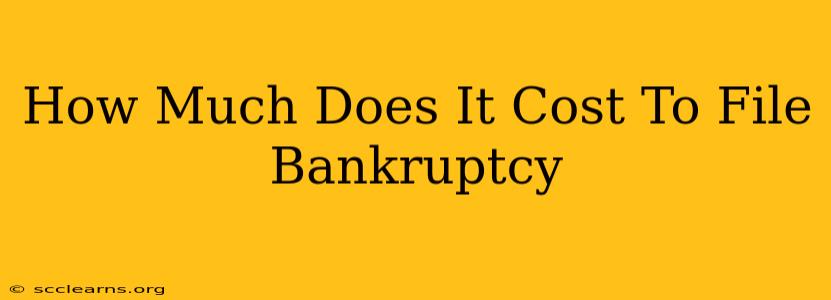Filing for bankruptcy can feel overwhelming, and one of the first questions many people ask is: how much will it cost? The answer isn't a simple number, as the expense varies significantly depending on several factors. This guide breaks down the potential costs associated with bankruptcy and helps you understand what to expect.
Understanding Bankruptcy Costs: A Breakdown
The total cost of filing for bankruptcy involves several different fees and expenses. These can be broadly categorized as:
1. Filing Fees: The Official Costs
The most straightforward cost is the official filing fee paid to the bankruptcy court. This fee is set by the federal government and varies slightly depending on the chapter of bankruptcy you file under (Chapter 7 or Chapter 13). You should expect to pay several hundred dollars in filing fees. It's crucial to check the current fee with the court clerk in your jurisdiction as these fees can change.
2. Attorney Fees: A Significant Expense
This is often the largest expense associated with bankruptcy. Attorneys' fees are charged hourly or based on a flat fee, and the amount can vary widely depending on the attorney's experience, location, and the complexity of your case. Factors influencing attorney fees include:
- Complexity of your financial situation: More complex cases with numerous assets, debts, and creditors will generally require more attorney time.
- Negotiation with creditors: Your attorney's involvement in negotiations can significantly impact the outcome and overall cost.
- Litigation: If your case involves litigation (lawsuits), the costs will increase substantially.
You should expect to budget several thousand dollars for attorney fees, although this can be less in some cases. Shopping around and getting quotes from multiple bankruptcy attorneys is highly recommended.
3. Credit Counseling and Debt Management Courses: Mandatory Requirements
Before filing for bankruptcy, most jurisdictions require you to complete credit counseling and potentially debt management courses. These courses typically cost a small fee, usually between $50 and $100. The exact cost and providers vary, but your bankruptcy attorney can guide you.
4. Other Potential Costs: Unexpected Expenses
While less common, some additional costs might arise, including:
- Court costs beyond the filing fee: There might be additional court costs associated with specific proceedings or motions in your case.
- Administrative expenses: These are expenses associated with the bankruptcy administration process, although they are typically relatively small.
- Appraisal fees: If you have significant assets, an appraisal might be necessary, adding to your overall costs.
Minimizing Bankruptcy Costs: Strategies for Saving Money
While bankruptcy costs are unavoidable, you can take steps to minimize expenses:
- Seek free or low-cost consultations: Many bankruptcy attorneys offer free initial consultations, allowing you to compare their services and fees.
- Consider a flat-fee attorney: Some attorneys offer flat fees for straightforward bankruptcy cases, which can provide budget certainty.
- Explore legal aid societies: If you are low-income, you might qualify for legal aid services providing free or low-cost legal assistance.
- Carefully review attorney agreements: Ensure you understand all fees and charges before signing any agreement with an attorney.
Chapter 7 vs. Chapter 13: Cost Implications
The choice between Chapter 7 and Chapter 13 bankruptcy also impacts costs. Chapter 7 is generally less expensive in attorney fees as it typically involves a shorter process. Chapter 13, on the other hand, involves a longer repayment plan and consequently higher attorney fees.
Conclusion: Planning for Bankruptcy Costs
Filing for bankruptcy is a significant financial decision, and understanding the associated costs is essential. By carefully considering the various expenses involved and taking steps to minimize costs, you can better prepare for the bankruptcy process. Remember to consult with a qualified bankruptcy attorney to discuss your specific circumstances and obtain a personalized cost estimate. This ensures you make informed choices and navigate the process effectively.

